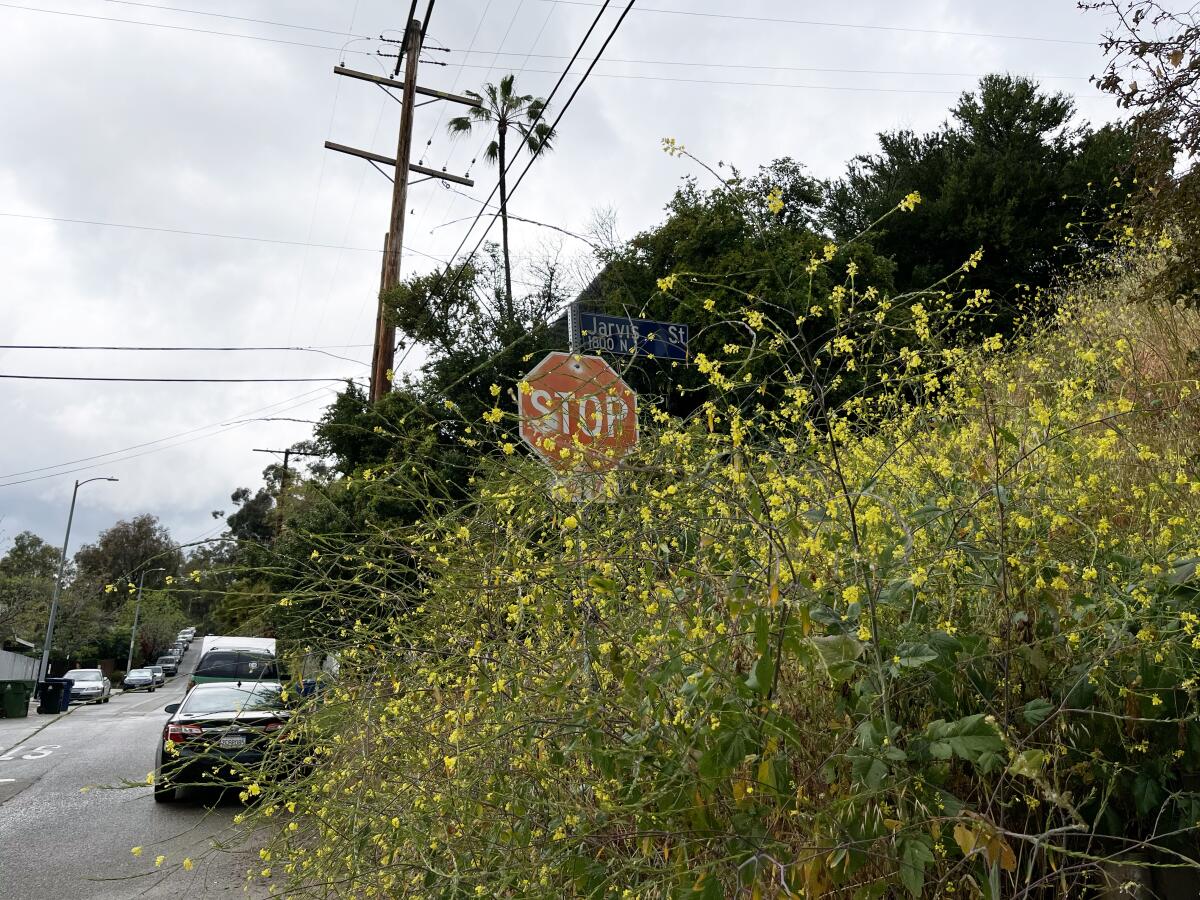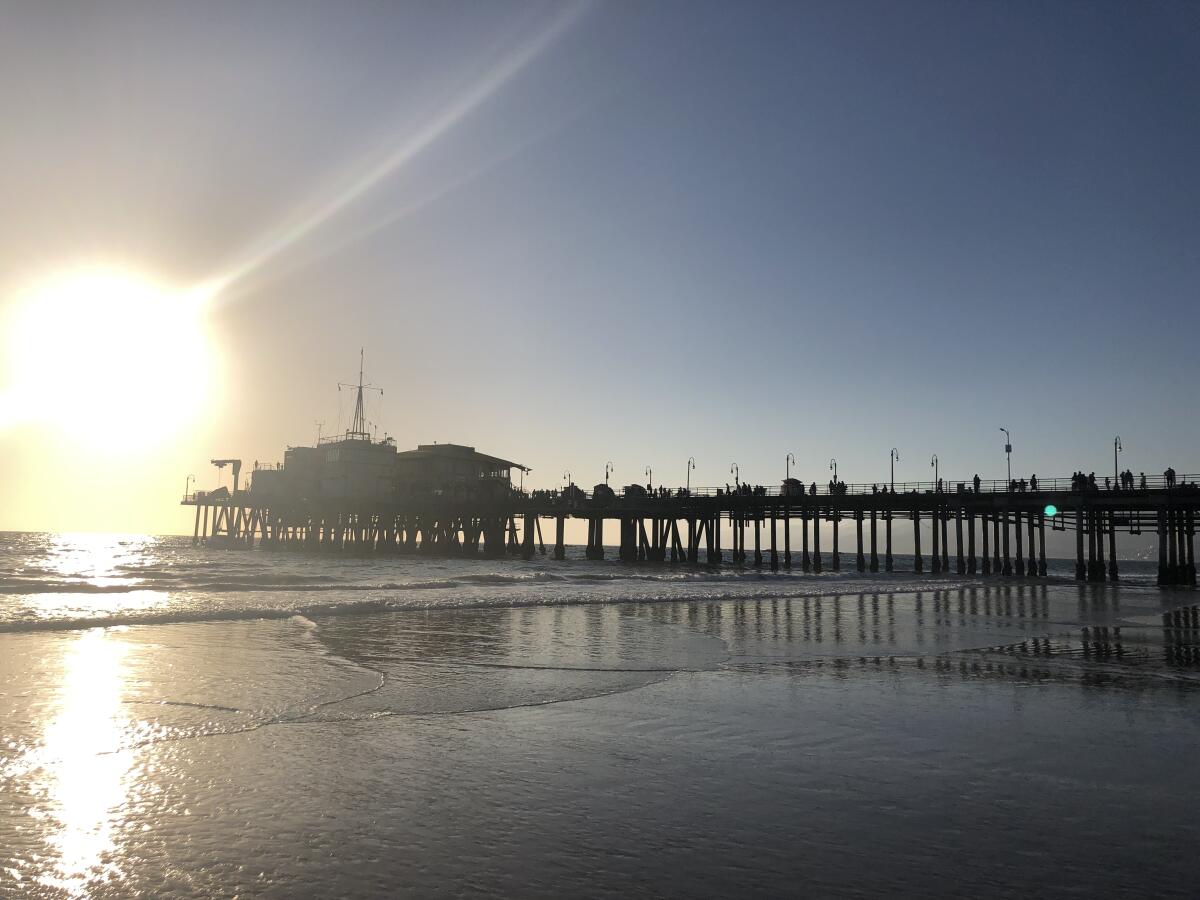Could charging Big Tech a ‘journalism usage fee’ help save local news?

- Share via
Good morning, and welcome to the Essential California newsletter. It’s Thursday, May 11.
In my classroom at Cal State Northridge, where I teach journalism, I often discuss the state of the industry in California and the rest of the U.S. When my students share their perspectives and concerns about the field, some gingerly assert that the newspaper industry is spiraling toward death.
They’re not wrong to be concerned. Nationally, newspaper circulation and revenue both plunged by more than 50% from 2002 to 2020. Employment in newspaper newsrooms plummeted 57% between 2008 and 2020.
To survive, newspapers big and small had to adapt to a rapidly evolving digital world, mastering social media and becoming search engine tacticians to increase the likelihood Google users would see their stories at or near the top of search results — all in hope of getting news stories in front of the eyes of readers flush with competing “content” (one of my least favorite words).
Having worked in small, local newspaper newsrooms for the early phase of my career, I’ve experienced the struggles firsthand: the buyouts, the layoffs, the uncertainty and the hard choice between staying for public service or leaving for a more sustainable paycheck.
And as research has shown, a lack of local news opens the door to more government corruption. Without local news outlets keeping tabs on the dealings of people and institutions in power, that power tends to get abused, and residents — often marginalized to begin with — are the ones who pay the price.
There’s no single cause for the sorry state of local news, but we do know that major tech platforms, especially Google and Meta (which owns Facebook) play a major role in how the public accesses and engages with local journalism. And while those platforms can facilitate great access to readers, they’ve also siphoned off billions in ad revenue that newspapers and other outlets rely on.
But a new state bill aims to give ailing news outlets in California a shot of adrenaline, though some organizations worry it could make things worse.
Loosening Big Tech’s ‘vise grip’
AB 886, dubbed the California Journalism Preservation Act, would charge a “journalism usage fee” to large platforms that make news content available on their sites. The revenue from those fees would then be apportioned out to “eligible digital journalism providers,” with a requirement that at least 70% of proceeds go directly to supporting newsroom journalists “and maintaining or enhancing the production and distribution of news or information.”
The specific amount of money paid out to each publication would be determined through an arbitration process, with a calculation based on the ad revenue generated by the platforms and individual news outlets’ online reach.
Though they’re not singled out by name, the platforms that would qualify as big enough to pay up are small in number but large in influence, namely Google and Meta.
Assemblymember Buffy Wicks (D-Oakland) introduced the bill, which she said was borne out of her concerns about the decline of local newsrooms and the implications that has on the health of democracy in the Golden State.
“Journalists and newsrooms are critical to hold people like me’s feet to the fire and hold us accountable,” she said. “When you have robust local news, you have someone’s eyes on City Hall at all times, someone’s eyes on what’s happening in the community, on law enforcement, on all the things that matter.”
The bill has bipartisan support, with Riverside Republican Assemblymember Bill Essayli joining as a co-author.
“I don’t believe in corporate welfare; I don’t believe in transferring wealth,” Essayli said earlier this month when the bill was passed unanimously by the Assembly Judiciary Committee. “But I also don’t believe in unjust enrichment. And I do think Big Tech is being unjustly enriched off the backs of journalists.”
To state the obvious, I and my fellow L.A. Times journalists have a considerable stake in this issue. Our unit is part of the Media Guild of the West, which has announced its support for AB 886.
“As a union of working journalists, corporate exploitation is the same whether it comes from a news publisher’s boardroom or a tech platform’s boardroom, and if any corporation unfairly profits from our labor, we will demand fair pay for that labor,” union leaders wrote in a statement. “The Guild will support measures such as the California Journalism Preservation Act … on the condition that such measures serve the public interest and support the protection or creation of journalism jobs.”
Emily Charrier, chair of the California News Publishers Assn., said the bill is an opportunity to recalibrate “a system that never played fair.”
“Although local news outlets employ more than 75,000 print, digital and broadcast professionals across the state, the tech mega-conglomerations of Google and Facebook capture 60% of digital ad dollars … without employing a single reporter,” Charrier wrote in a blog post. “Their vise grip on the market has shuttered newsrooms across the Golden State, leaving a sea of news deserts, especially in marginalized areas.”
But not every news organization that serves California communities is supportive of the legislation.
Differing views on how to protect journalism

Ken Doctor founded Lookout Santa Cruz in late 2020, aiming to create a sustainable model for local news after years of studying the industry’s decline as a prominent media analyst.
He believes state lawmakers have good intentions and is adamant about local journalism’s role as a vital public service.
“You can’t run a local democracy if people don’t have basic information about the government and the power that surrounds them, whether it’s school districts or business or labor,” he said. “People need to know what’s going on to be able to actually activate a democracy.”
But he’s concerned the current bill is too “squishy” and will open the door to funding digital publishers that peddle misinformation or disinformation with a political agenda. He also warned it could lead to more “pink slime journalism” — lurid, clickbait headlines that attempt to pass as local news but don’t provide the public with any useful information about what’s happening in their community.
Doctor’s worries don’t end there, as he explained:
“My fear is that [the bill] would disproportionately prop up the companies that have been depleting local journalism for the last 10 years, and do relatively little for outfits like my own.”
Those companies include Alden Global Capital, a hedge fund that owns more than 30 newspapers in California and dozens more across the country. In 2021, Alden purchased Tribune Publishing, which formerly owned the L.A. Times.
There’s been a dearth of coverage of Alden’s modus operandi: buy struggling newspapers, squeeze out all the revenue possible while gutting newsroom staff, and pocket the profit.
Doctor doesn’t want to further enable those “cutthroat hedge funds that have destroyed about half of the American daily news business.”
“I applaud the legislators’ want to help the local news business,” he said. “But I think what they really need is a much deeper and wider understanding of the mechanics and nuances of how that business works.”
So what would Doctor like to see? He was encouraged by a previous effort at the federal level, dubbed the Local Journalism Sustainability Act, which would have established a series of tax credits: for individuals who subscribed to local news publications; for local outlets that hired and retained news workers; and for small- and medium-sized businesses that advertised with local outlets.
That bill never made it out of the U.S. House Committee on Ways and Means.
What’s next?
Wicks said she welcomes the points of view from news publishers opposed to the bill and hopes they’ll help strengthen the legislation.
“I won’t move the bill forward if I think it’s going to have negative unintended consequences that further exacerbate the news media crisis that we’re in,” she said.
Wicks added that her office is working on amendments to the bill in the coming weeks “to make sure that the bill really does help local newsrooms.”
“We’re [going to] beef up the language around that to ensure that the money actually goes to newsrooms and journalists ... and we’re working closely with the unions on that piece of it,” she added.
Similar legislation has been proposed in other states and at the federal level. Outside the U.S., Australia adopted a similar law in 2021, and Canada is considering a version as well.
Shocking no one, major tech platforms are not fans of this and similar efforts. Meta previously threatened to pull news content from its platforms in reaction to another federal bill that was floated but was ultimately dropped. And the social media giant made similar threats in the face of Canada’s current effort.
Wicks said the threats have “so far been paper tigers.”
“I think at the end of the day, the publishers’ content is a value to them,” she said. “They want eyeballs on their screen.”
And now, here’s what’s happening across California:
Note: Some of the sites we link to may limit the number of stories you can access without subscribing.
L.A. STORIES

Go outside and it’s hard to miss the fact that plant life is out in flowering force across L.A. The key takeaway of this spring’s bountiful blooms, according to my colleague Corinne Purtill: “Do not confuse a dry brown hillside or field for a lifeless wasteland. It may be a nursery of wildflowers just waiting for the right time to flourish.” Los Angeles Times
POLITICS AND GOVERNMENT
Under current state law, Californians with disabilities can be paid below the state’s minimum hourly wage. An incoming state law will change that, but some in the disability services community worry workers won’t be provided enough resources to help them compete for jobs. CalMatters
The city of Long Beach is exploring options for suing outside agencies and businesses for sewage spills that force closures on its coastline. Spills have closed city beaches twice this year, and one official said that affects the local economy — and Long Beach’s reputation. Long Beach Post
CRIME, COURTS AND POLICING
California will pay $24 million to settle a wrongful-death lawsuit more than three years after a 38-year-old man died while being pinned to the ground by CHP officers. Seven officers and a nurse face manslaughter charges in connection to the March 2020 killing of Edward Bronstein. An attorney for Bronstein’s family said the payout is the largest civil rights settlement in state history. Los Angeles Times
California is launching a civil rights investigation into the Antioch Police Department, Atty. Gen. Rob Bonta announced Wednesday. That follows weeks of community outrage in the Contra Costa County city after racist and homophobic text messages by officers were made public. KQED
Exotic birds — many of them parrots — are being nabbed from porches, pet stores and veterinary offices across SoCal. Some aficionados say the rash of thefts speaks to the birds’ soaring popularity, which could fetch parrot pirates hefty profits on the black market. Los Angeles Times

Support our journalism
HEALTH AND THE ENVIRONMENT
A $16-billion tunnel plan to transport Sacramento-San Joaquin River Delta water to Southern California got a big thumbs-down from an advocacy group. A report from the California Water Impact Network warns of major flaws in the project and urges the Metropolitan Water District to let it sink. Los Angeles Times
California’s ambitious goals to phase out fossil fuel cars and heavy trucks and transition to electric engines is kick-starting a whole new labor market. SoCal community college students — ranging from recent high school grads to auto service veterans — are training to be a part of that new future. LAist
Free online games
Get our free daily crossword puzzle, sudoku, word search and arcade games in our new game center at latimes.com/games.
AND FINALLY
Today’s California landmark is from Orna Y. of Los Angeles: the Santa Monica Pier and its showcase of “the natural wonder of a low tide at sunset.”

Orna writes:
The Santa Monica Pier has a rich past and beautiful present and presence. It is a magical old structure with the gorgeous and forceful ocean background that changes each moment of each day, never looking the same. During the low tide on October 27, 2022, the magic intensified as the sunset reflected on the gleaming ocean floor.
What are California’s essential landmarks? Fill out this form to send us your photos of a special spot in California — natural or human-made. Tell us why it’s interesting and what makes it a symbol of life in the Golden State. Please be sure to include only photos taken directly by you. Your submission could be featured in a future edition of the newsletter.
Please let us know what we can do to make this newsletter more useful to you. Send comments to essentialcalifornia@latimes.com.
Sign up for Essential California
The most important California stories and recommendations in your inbox every morning.
You may occasionally receive promotional content from the Los Angeles Times.







